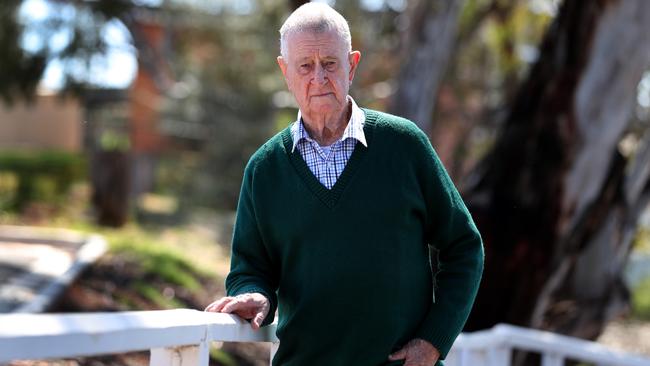
The corporate tweet from the chain asked the customer which store the out of date goods had been purchased from.
The brief reply came typed in Scottish drawl, “Am no a grass.”
The amusing social media exchange between individual and large corporation was illustrative. The Scots are by nature anti-authoritarian. Given their history, it is understandable.
Australians might like to think they are of a similar bent. A healthy distrust of authority, a them and us relationship with government and active support for the individual to succeed in spite of the numerous hurdles thrown in his or her path by the function of government and bureaucracy.
Our recent history would suggest that our view of ourselves has changed, and not for the better.
READ MORE: Your right to know
Let’s start with a simple proposition that at least still exists in sentiment as a cornerstone of centrist and conservative political philosophies in this country: the notion of small government, a light touch on the public and a similarly deft use of public funds.
That’s a rather lovely ambition, isn’t it? Something to strive for surely.
The reality is government of both political stripes has over the past two decades become bigger, more costly, more intrusive and the reach of its surveillance extends to all of its citizens almost without exception, the most notable of which is those who direct and undertake the surveillance.
How can we be happy about this? At what point did we begin to extol the dubious virtues of big, intrusive government? Have we been played? Is the national identity little more than a whimpering expression of insecurity? Have we become a nation of coppers?
If anyone thinks law enforcement in this country doesn’t cut corners and cloaks itself in secrecy to avoid scrutiny, I have two words for you: Nicola Gobbo.

Here we have a law enforcement agency, the Victoria Police Force, having spent millions of dollars in taxpayer-funded court cases to prevent the public knowing that they had used an informant to prosecute individuals that she shared a legal professional privilege with.
I’ve spoken to a lot of former police about it. Some think what VicPol did was sound. The cops got violent gangsters off the streets and behind bars. It is a fundamental ends and means proposition. I understand the argument.
Here, in part, is what the High Court said in December last year:
“EF (Nicola Gobbo’s pseudonym in proceedings), while purporting to act as counsel for the convicted persons, provided information to Victoria Police that had the potential to undermine the convicted persons’ defences to criminal charges of which they were later convicted,” the December High Court judgment noted.
“EF’s actions in purporting to act as counsel for the Convicted Persons while covertly informing against them were fundamental and appalling breaches of EF’s obligations as counsel to her clients and of EF’s duties to the court.
“Likewise, Victoria Police were guilty of reprehensible conduct in knowingly encouraging EF to do as she did and were involved in sanctioning atrocious breaches of the sworn duty of every police officer to discharge all duties imposed on them faithfully and according to law without favour or affection, malice or ill-will.
“As a result, the prosecution of each convicted person was corrupted in a manner which debased fundamental premises of the criminal justice system.”
Now there is a Royal Commission and an expectation that many dangerous criminals may be released from prison prematurely. If the ends had justified the means fifteen years ago, what is now clear is that the means are considerable, the price tag has gone up, tens of millions of dollars and counting, with the end nowhere in sight.

The Herald-Sun drove this story from day one and journalist Anthony Dowsley in particular deserves credit. VicPol fought every step of the way to avoid the story being run. Threats of legal action. Injunctions on publication. The pressure was fierce.
I had my own experience with Victoria Police. Many readers know the story well. I wrote the book Unholy Trinity with a former VicPol detective, Denis Ryan. Denis was forced out of the job he loved when he tried to prosecute a prolific paedophile priest, Monsignor John Day in Mildura in 1972.
Before writing the book, we made an FOI application for all relevant files held by VicPol to be handed over. The application was rejected outright. No discussion, no correspondence would be entered into. Just a big, unequivocal no. So, we went to VCAT to appeal VicPol’s decision and won. VicPol duly handed over some files, a lot of them redacted.
What we ultimately learned was that the really damning documents had been withheld despite the VCAT order.
By that time, VicPol had thrown their hands up at the Royal Commission. After 42 years they could no longer defend the indefensible. Denis Ryan gave his evidence to the Commission. He was not cross examined.
Afterwards I asked the Chief Commissioner of Victoria Police Force, Graham Ashton, when he was going to apologise to Denis Ryan. He looked at me like I was something he’d just stepped in and mumbled a reply that the force would offer a formal apology in due course.
What was intriguing was the manner in which VicPol acknowledged their failings. Denis was invited to attend an apology ceremony at VicPol HQ. One journalist only was allowed to report on the proceedings, John Sylvester from The Age. Other journalists, including myself, were not welcome.
Sylvester wrote a lovely little piece about Denis Ryan and the courage he had shown but it was couched in terms of being a long time ago, an ages-old blemish that was finally being put right.
It was one step back and then put the shutters up at VicPol. What VicPol would have us believe is what amounted to a conspiracy to pervert the course of justice between senior members of the Victoria Police Force and a Catholic Bishop, Ronald Mulkearns, ended in 1972 and everything has been tickety-boo ever since.
If you believe that, I have a large bridge that spans The Rocks and Milson’s Point to sell you. Excellent condition. One owner. Only drove it to Church on Sundays etc.
We should never accept our history in redacted form. That’s the crime of it. Keeping a public misinformed. When public institutions draw the veil of secrecy, we can never properly understand our past or our present for that matter.
It is almost an irony that public institutions operate in secrecy. We fund them and they behave as if we owe them a living. The reach for the big red stamp that says ‘Secret’ is almost Pavlovian. More often than not the red ink on the page really means, potentially embarrassing or worse, culpable, criminal. Ultimately, it is a declaration that implicitly states that these public institutions are not accountable, not to you and me anyway.




Sometimes Twitter does what it says on the tin. I thought this when a republished tweet caught my eye earlier this week. A customer of a large supermarket chain in Scotland sent a tweet complaining they had been sold a product ten days past its use by date.